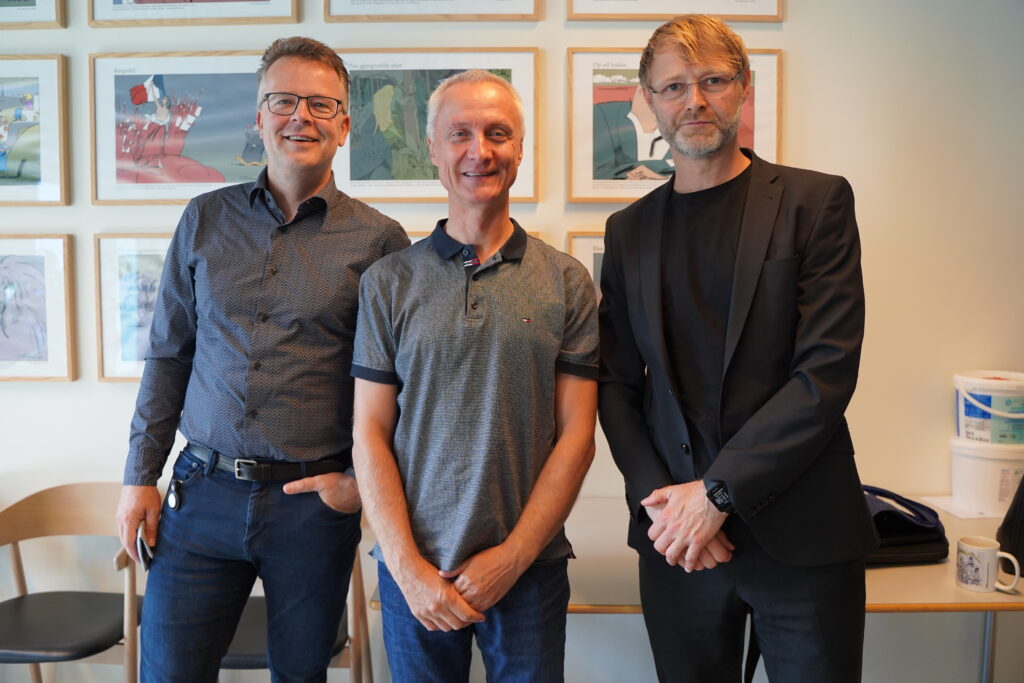By Alice Sprotte and Jeannette Bylov, AAU Kommunikation. Translated by LeeAnn Iovanni, AAU Communication
Artificial intelligence (AI) has become a major part of the societal debate, and the development of AI technologies has brought with it a number of new opportunities and dilemmas. Researchers at Aalborg University (AAU) will examine this across disciplines in a new, large-scale, four-year research project supported by the Grundfos Foundation with DKK 24 million.
Thomas B. Moeslund is heading the project, and he does not believe that value creation can be detached from the other areas.

The project is led by AAU researchers Jeppe Agger, Thomas B. Moeslund, and Thomas Ploug. Photo: Anne-Sophia Lundgaard Jensen, AAU Kommunikation
“To put it bluntly, it is probably difficult to sell AI technologies that are not socially acceptable or where the technology itself is not good enough. At the same time, the technology is increasingly subject to political regulation,” Thomas B. Moeslund says.
Along with Thomas Ploug, Professor in Data and AI Ethics and Jeppe Agger Nielsen, Professor in Organisation and Management at the Faculty of Social Sciences and Humanities, AAU, Thomas B. Moeslund will be part of the joint project management to ensure the interdisciplinary aspect of the research project.
Legislation and ethics in an explosive AI market
The AI market is undergoing explosive growth with many players. At the same time, many are concerned about the significance of the technologies for the individual and society. According to the researchers, there is a risk that the area will be over-regulated, which will effectively render companies paralysed. The consequence of this may be that other players – e.g. American and Chinese – run with the market because they have fewer restrictions.
Thus, there is a need for balanced regulation both now and in the future, and this is precisely the issue the project deals with. The questions are: What can we do technically? What should we do ethically? What can enrich society and businesses? And how do we regulate the area?
The research project therefore also examines how companies and organisations can use and make money from the new AI technologies in a way that is still ethically sound, socially acceptable and falls within the legislation. Like technology, the legislation is also under development in Denmark and the EU, but it may prove to be a challenge for companies and institutions.
“AI legislation may prove to be under-regulated by failing to protect citizens. However, there is also a risk of over-regulation and placing unreasonable restrictions on the business community’s opportunities to develop and use AI,” explains Thomas Ploug, Professor in Data and AI Ethics, Faculty of Social Sciences and Humanities, AAU.
He also points out that the legislation may be too complex, making it impossible for individual companies to implement.
All three scenarios are important to avoid if you want to maintain responsible and competitive AI development in Denmark and Europe, Thomas Ploug says.
AI can improve elder care and reduce drowning accidents
The project focuses on a number of specific AI cases to exemplify the opportunities and dilemmas for developing and using AI in a responsible way while also creating value for companies, organizations and citizens. The first two cases are: Aalborg Municipality’s use of AI in elder care and Milestone System’s intelligent cameras that sound the alarm if someone falls into the water.
“It is important that we get hands-on experience from companies that are introducing and using AI technology,” explains Jeppe Agger Nielsen, Professor in Organisation and Management, Faculty of Social Sciences and Humanities, and continues: “Implementing AI is often a huge task that requires managerial attention and courage. While there is a lot of talk about the opportunities and dangers of AI, in this research project we will take a close look at companies’ actual use of AI technology in a number of different industries and sectors.”
Background
The project is driven by a strong desire to contribute to the major work of developing legislation and policies in the AI area. The project therefore also emphasizes exchange with and communication to a wide range of stakeholders from politicians to the business community. To ensure high quality communication, the project is partnering with consulting firm Mandag Morgen.
The subject matter of the research project is large and complex, which requires an interdisciplinary project team representing diverse disciplines. Collaboration across disciplines is not trivial, and therefore the project will also devote particular attention to this with a separate research effort that, in conjunction with two other AI projects, ‘Algorithms, Data and Democracy’ and ‘Pioneer Center for AI’, examines how collaboration in larger AI projects takes place and can be improved.
Facts
- The project stems from the interdisciplinary AAU centre ‘AI for the People’ – but is an independent project.
- The project runs for four years and is supported by the Grundfos Foundation (Poul Due Jensen Foundation) with DKK 24 million.
- Thomas B. Moeslund is affiliated with the Department of Architecture, Design and Media Technology; Thomas Ploug with the Department of Communication and Psychology; and Jeppe Agger Nielsen with the Department of Politics and Society at Aalborg University.
- The project is led by AAU. Project partners are from the University of Copenhagen, Aarhus University, University of Barcelona, University of Manchester and Georgia State University.

